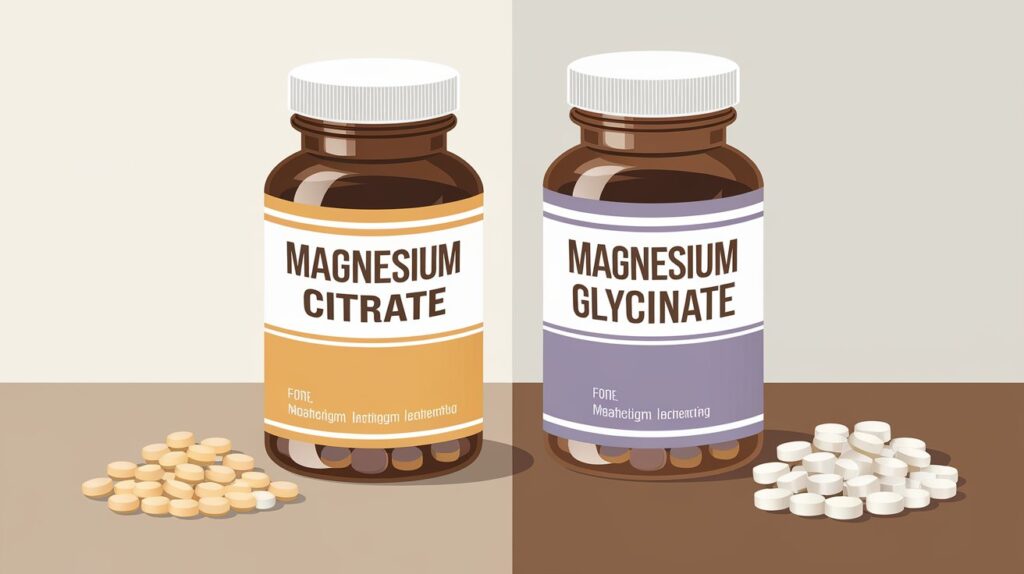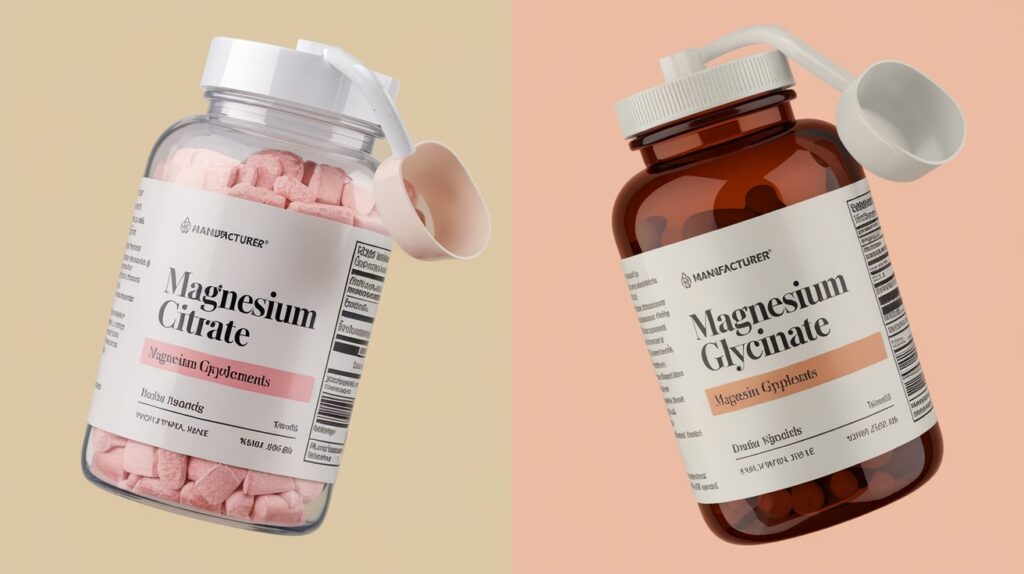In this Magnesium Citrate vs Magnesium Glycinate face-off, we pit these two popular forms of magnesium supplements against each other to see which is the best essential mineral.
From bioavailability to price, digestive effects, sleep quality, anxiety relief, and specific health benefits – discover which is the best to buy for those looking to optimize their magnesium levels.
Magnesium Citrate vs Magnesium Glycinate: Specs
| Magnesium Citrate | Magnesium Glycinate | |
|---|---|---|
| Primary benefit | Digestive health support | Relaxation, stress relief, sleep |
| Bioavailability | Moderate to high (20-30%) | Very high |
| Laxative effect | Yes (mild to moderate) | Minimal to none |
| Best for | Constipation relief, quick magnesium boost | Sleep support, anxiety relief, sensitive stomachs |
| Average price | $15-25 for 120 capsules | $20-30 for 120 capsules |
| Elemental magnesium | ~16% by weight | ~14% by weight |
| Typical dose | 200-400mg daily | 200-400mg daily |
| Form | Tablets, capsules, powder, liquid | Tablets, capsules, powder |
| Taste | Slightly sour, citrus-like due to citric acid | Generally neutral, slightly sweet |
| Side effects | May cause loose stools, digestive discomfort | Typically mild, minimal gastrointestinal side effects |
Magnesium Citrate vs Magnesium Glycinate: Price

Magnesium citrate is typically the more budget-friendly option among dietary supplements. A standard bottle of magnesium citrate supplements (120 capsules, 200mg) generally costs between $15-25, making it accessible for most consumers looking to supplement their daily intake of this essential mineral.
Magnesium glycinate, due to its more complex production process and higher bioavailability, usually commands a higher price point. Expect to pay between $20-30 for a comparable 120-capsule bottle. The price difference isn’t substantial, but over time, magnesium citrate offers more value purely from a cost perspective.
However, the price comparison should also account for effectiveness and suitability for your specific health conditions. If you’re primarily looking for digestive support and general magnesium supplementation, citrate offers better value. If you need something gentler on the stomach with better calming effects, the slight premium for glycinate may be worth it.
Based on pure cost-effectiveness, citrate wins this category, but the margin is small enough that individual medical conditions should be the primary determining factor when choosing between these popular types of magnesium supplements.
Winner: Magnesium Citrate
[Buy Magnesium Citrate now]
Magnesium Citrate vs Magnesium Glycinate: Absorption

When it comes to how well your body can utilize these supplements, both forms perform admirably, but with different strengths. Magnesium citrate offers a bioavailable form at approximately 20-30% absorption, making it an effective option for raising magnesium levels. Its ionic bond with citric acid helps it dissolve easily in water, facilitating absorption in the digestive tract.
Magnesium glycinate, however, takes the edge in this category. By binding magnesium to the amino acid glycine, this form creates a chelated compound that the body can absorb more efficiently. Research indicates that glycinate has superior bioavailability compared to most other forms of magnesium like magnesium oxide and magnesium salt, with minimal competition from other minerals during absorption further optimizing magnesium levels.
Additionally, glycinate’s absorption doesn’t rely on stomach acid levels as heavily as citrate does, making it more consistent across different people and conditions. For those with compromised digestive systems or those taking acid-reducing medications, glycinate maintains its effectiveness while citrate may show reduced absorption.
The superior absorption profile of magnesium glycinate means you’ll likely need a lower dose to achieve the same blood magnesium levels compared to citrate, potentially offsetting its higher cost. According to the National Institutes of Health, adequate levels of magnesium are essential for over 300 bodily functions, including energy production and nerve function.
Winner: Magnesium Glycinate
[Buy Magnesium Glycinate now]
Magnesium Citrate vs Magnesium Glycinate: Digestive Effects

The digestive impact represents perhaps the starkest contrast between these two types of magnesium supplements. Magnesium citrate has a well-established reputation as an osmotic laxative. It works by drawing water into the intestines, which softens stool and stimulates bowel movement. This effect makes it particularly valuable for those dealing with occasional constipation or irregularity.
Magnesium citrate’s action begins relatively quickly, often producing noticeable effects within 30 minutes to 3 hours. This laxative effect can range from mild to quite pronounced depending on dosage and individual sensitivity. While beneficial for some, this can be problematic for others, particularly those with sensitive digestion or inflammatory bowel conditions.
Magnesium glycinate, by contrast, has minimal impact on bowel movements. The glycine component allows for improved absorption in the small intestine before reaching the colon, significantly reducing any laxative effect.
This makes it the superior choice for those with sensitive stomachs, irritable bowel syndrome, or anyone who wants to avoid the gastrointestinal side effects while still benefiting from supplemental magnesium.
For digestive support specifically, citrate is clearly superior. However, if you’re seeking magnesium benefits without digestive side effects, glycinate is the clear winner among the different forms of magnesium available.
Winner: Depends on needs (Citrate for constipation, Glycinate for sensitive digestion)
[Buy Magnesium Citrate now] [Buy Magnesium Glycinate now]
Magnesium Citrate vs Magnesium Glycinate: Sleep Support

Quality sleep is essential for overall health, and magnesium supplements can play a significant role in supporting restful sleep. When comparing our contenders specifically for sleep benefits, magnesium glycinate emerges as the superior option among all forms of magnesium supplements.
Magnesium glycinate’s effectiveness for sleep quality comes from its dual-action approach. The magnesium itself helps activate the parasympathetic nervous system, promoting relaxation and preparing the body for sleep.
Additionally, the amino acids in glycine have independent sleep-enhancing properties. Research shows glycine can improve sleep quality, reduce the time it takes to fall asleep, and decrease daytime sleepiness following sleep restriction.
Magnesium citrate does provide some sleep benefits through magnesium’s natural calming effects but lacks the synergistic effect of the glycine component. Additionally, citrate’s potential laxative effect can actually disrupt sleep if it causes nighttime bathroom trips, affecting your energy levels the next day.
Clinical studies and systematic review of the effects of magnesium supplementation consistently favor glycinate for sleep improvement. Many users report falling asleep faster, experiencing fewer nighttime awakenings, and feeling more refreshed in the morning when taking magnesium glycinate regularly, especially when taken 1-2 hours before bedtime.
Winner: Magnesium Glycinate
[Buy Magnesium Glycinate now]
Magnesium Citrate vs Magnesium Glycinate: Anxiety Relief

Both magnesium forms can help manage symptoms of anxiety, but magnesium glycinate demonstrates superior efficacy for this specific purpose. Glycinate’s advantage stems from the combined neurological benefits of both magnesium and glycine.
Magnesium itself plays a crucial role in regulating neurotransmitters that affect stress and anxiety. It helps modulate GABA receptors (the same receptors targeted by anti-anxiety medications), regulates stress hormones like cortisol, and supports healthy nerve function. The glycine component adds additional calming effects by acting as an inhibitory neurotransmitter in the central nervous system.
Clinical research indicates that magnesium glycinate may help reduce subjective anxiety, decrease stress response, and improve resilience to psychological stressors. Many healthcare providers now recommend this specific form of magnesium for patients dealing with anxiety, panic attacks, or high-stress lifestyles.
Magnesium citrate can provide some anxiety relief through its magnesium content, but lacks the specific neurological benefits of glycine. Additionally, any digestive discomfort from citrate’s laxative effect could potentially exacerbate physical symptoms of anxiety for sensitive individuals.
For those specifically seeking anxiety relief from their magnesium supplement, glycinate represents the clearly superior choice compared to other forms of magnesium like magnesium chloride, magnesium L-threonate, or magnesium taurate.
Winner: Magnesium Glycinate
[Buy Magnesium Glycinate now]
Magnesium Citrate vs Magnesium Glycinate: Muscle Function

Both forms of magnesium support healthy muscle function, but their specific benefits differ slightly. Magnesium plays a critical role in muscle contractions and relaxation, making it valuable for athletes, active individuals, and those suffering from muscle cramps or muscle pain.
Magnesium citrate delivers magnesium effectively to muscles and can help alleviate acute muscle cramps or tightness. Its rapid absorption means it can provide relatively quick relief. Many athletes use magnesium citrate specifically before or after intense workouts to prevent cramping and support muscle recovery.
Magnesium glycinate offers comparable muscle benefits with potentially greater sustained effects due to its superior absorption and retention. The glycine component provides additional benefits for connective tissue and muscle recovery. However, its more gradual action means it’s better suited for ongoing maintenance rather than acute symptom relief.
Clinical studies examining the effects of magnesium supplementation on exercise performance and recovery show benefits from both forms, with slight advantages to glycinate for long-term use and citrate for acute situations. The difference isn’t substantial enough to declare a clear winner, as both perform admirably in supporting muscle function.
Winner: Tie
[Buy Magnesium Citrate now] [Buy Magnesium Glycinate now]
Magnesium Citrate vs Magnesium Glycinate: Special Features
Beyond their primary benefits, both supplements offer unique advantages worth considering for various health conditions.
Magnesium citrate provides enhanced calcium absorption, making it valuable for bone health when taken alongside calcium supplements. Its ability to dissolve completely in liquids makes it versatile for those who struggle with pills. Citrate also supports kidney health by potentially reducing the risk of kidney stone formation through its citric acid component.
Magnesium glycinate offers superior neurological support beyond just anxiety relief. The glycine component supports cognitive function, healthy collagen synthesis, and may help protect against cellular damage.
Glycinate is also notably less likely to interact with medications than some other forms of magnesium, making it suitable for those on multiple prescriptions (though always consult a healthcare professional).
For sensitive populations, including pregnant women, elderly individuals, and people with type 2 diabetes or those with compromised kidney function, glycinate’s gentler profile and minimal potential side effects give it the edge in safety and tolerability. Additionally, its lack of laxative effect allows for higher dosing when necessary. This can be beneficial for addressing severe magnesium deficiency.
Given glycinate’s broader range of unique benefits and superior safety profile for various populations, including those with blood pressure and blood sugar level concerns, it narrowly wins this category.
Winner: Magnesium Glycinate
[Buy Magnesium Glycinate now]
Magnesium Citrate vs Magnesium Glycinate: Overall Winner
| Magnesium Citrate | Magnesium Glycinate | |
|---|---|---|
| Price (10 points) | 8 | 7 |
| Absorption (15 points) | 12 | 15 |
| Digestive Effects (15 points) | 12 | 13 |
| Sleep Support (20 points) | 14 | 20 |
| Anxiety Relief (15 points) | 10 | 15 |
| Muscle Function (15 points) | 15 | 15 |
| Special Features (10 points) | 7 | 9 |
| Overall (100 points) | 78 | 94 |
It’s a clear victory for magnesium glycinate in this comparison, though the margin shouldn’t suggest that magnesium citrate is ineffective. Both supplements deliver valuable benefits, but glycinate’s superior bioavailable form, minimal gastrointestinal side effects, and exceptional support for sleep quality and anxiety give it a substantial edge for most users.
Magnesium citrate remains an excellent choice for those specifically seeking digestive support or a more budget-friendly option. Its long history of use and well-established safety profile make it a reliable supplement that continues to benefit millions of people looking to maintain adequate magnesium levels and prevent magnesium deficiency.
However, for overall wellness, particularly for those dealing with sleep issues, anxiety, or digestive sensitivity, magnesium glycinate represents the superior investment. Its gentle action, high bioavailability, and synergistic benefits from the glycine component make it the standout choice for most people’s health needs compared to other types of magnesium supplements like magnesium malate, magnesium oxide, or magnesium chloride.
Overall Winner: Magnesium Glycinate
[Buy Magnesium Glycinate now]